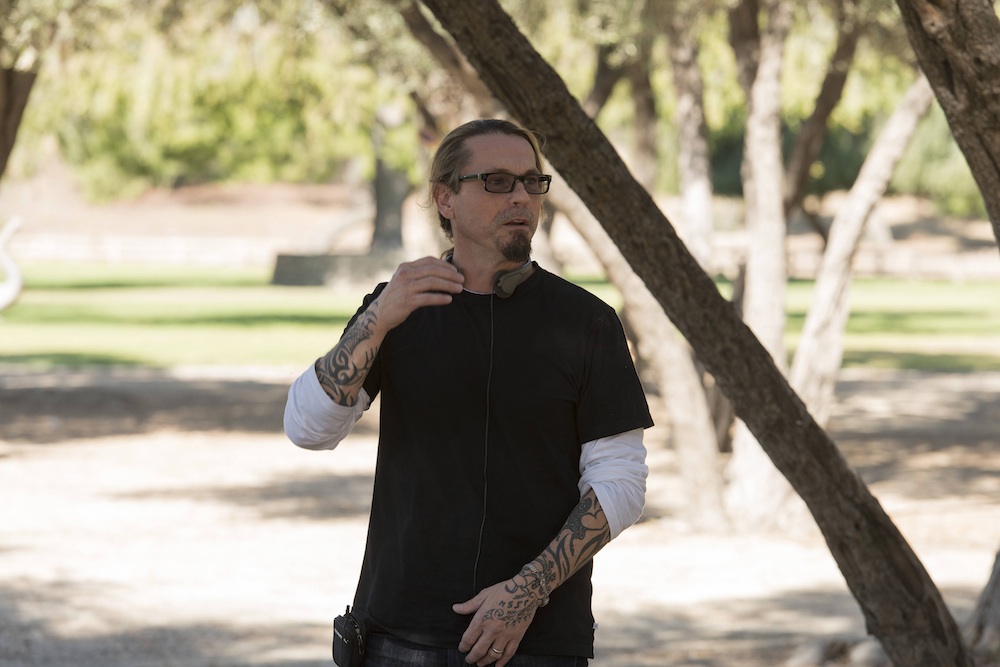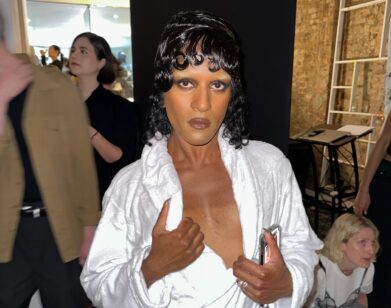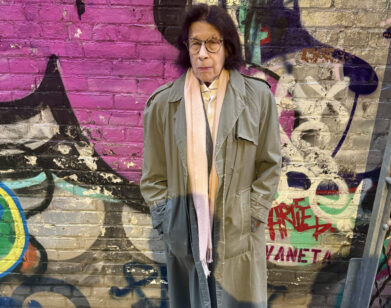Sutter After SAMCRO

ABOVE: KURT SUTTER. PHOTO COURTESY OF FX.
Kurt Sutter’s new series, The Bastard Executioner, seems a world away from his compulsive Hamlet-inspired, biker gang drama Sons of Anarchy. And it is. While Sons took place in present-day Northern California, Bastard is set in 14th-century Wales, where the locals are struggling against the oppressive feudal system of the English Marcher Lords and mysticism melds with reality. But it is still is very much a Kurt Sutter show: a dark, bloody account of a marginalized group and their conflicted leader, pulled apart by his duty to his people, his family, and his desire for revenge.
Australian actor Lee Jones plays the show’s hero, Wilkin Brattle, a former knight of England. Disillusioned with grisly battles, Brattle lays down his sword and retreats to the Welsh countryside to lead a simple, peaceful life. It doesn’t work out. By the end of the two-hour pilot, Brattle has gone from budding family man to the titular Bastard Executioner.
Although Jones is largely unknown, there are plenty of familiar faces in the series. Katey Sagal, Kurt Sutter’s wife and the Gertrude to Jax’s Hamlet in Sons of Anarchy, plays a mystic healer of ambiguous origins and intentions. True Blood‘s Stephen Moyer assumes the role of head villain as Milus Corbett, the right-hand man of the village’s feudal lord, Baron Ventris. Genuine Welshman Matthew Rhys pops up as Gruffudd y Blaidd, leader of the Welsh rebel forces. Sutter himself appears—albeit disguised by a cloak and heavy prosthetics—as a character called “The Dark Mute.”
Ahead of the show’s premiere tomorrow night, we spoke with actor, writer, and showrunner over the phone.
EMMA BROWN: What made you decide to set The Bastard Executioner in Wales? Was that part of the original idea?
KURT SUTTER: No. I had the period and the world down, as far as what I wanted. But originally I was going to set it in Northern England—in Northumberland right below the Scottish border. We had scouted Wales because they have, thanks to Edward I, more castles per capita than pretty much anywhere else in Europe, and the Welsh government was so accommodating that we decided to set our production there. I started doing some more specific research on Wales in that period because I like the idea of being authentic to the territory, and with that came the knowledge that there was this great rebellion that was happening with the Marcher barons and conflict with the king. A lot of it wasn’t documented by the English, so there was a lot of fiction to play with within the fact. It ended up being this great external conflict for our world. That became more of a compelling pull towards Wales than the production advantages.
BROWN: Did you have to adjust your characters to fit the new setting?
SUTTER: At that point, I had my main character carved out and the way into our series, but I was able to take the idea of setting it in Wales and use that to my advantage in developing other characters. I was able to give them more specificity. The Baronness [Ventris, played by Flora Spencer-Longhurst] is a much more complex character now, because she is of Welsh origins and married to protect her land. It helped me give me some of the characters that I already had a sense of a much more three-dimensional point of view.
BROWN: I read that Stephen Moyer had reached out to you about working together because he was such a fan of Sons of Anarchy. Is that true?
SUTTER: I’ve known Stephen, really through friends, for a while. We’ve been mutual fans of each other, he and his wife [Anna Paquin]. There was a role that they were possibly going to do on Sons and they were excited about it, but it fell after True Blood had wrapped and they had this family vacation planned. I didn’t want to disrupt that and nor did they, so that didn’t work out. But that’s where it began. We stayed in touch. I had lunch with Stephen in London a couple of times even as I was writing it, just feeling him out and seeing what he was doing and what he wanted to do. When the script was done I took him to lunch again and handed him the script: “Just give it a read and maybe look at this character.” I heard back from him with a lot of enthusiasm. For roles like that and people like that, if I really have somebody specific in mind, I prefer to do it that way. After there’s an agreement and an understanding creatively and collaboratively, we hand it off to lawyers and agents to figure out the business side of it.
BROWN: Matthew Rhys is almost unrecognizable as the Welsh rebel leader. How did that come about?
SUTTER: I’d met Matthew at a couple of FX things with The Americans—just very much in a work environment. I was aware of his Welsh origins. He was another one who I’d sent the script to early on. I wanted him to take a look at it because I didn’t know where we were going to land in terms of the ages of people. He loved the script, but simultaneously I found out that The Americans was going to be picked up for another season. He couldn’t do a series regular role in both shows, so in my mind it was like, “Okay.” Then I got a call from Matthew saying, “Who’s playing the rebel leader? That’s not a series regular role.” And I was like, “I’ll probably cast some older Welsh guy.” “Oh…” I got an email a day later of Matthew with a long grey wig and a beard, and he said, “I can look pretty rugged and older in period.” He’s Welsh; he loves that period; he’s been wanting to do a production about the rebellions and the Marcher lords on his own. I so respected that, that I was just like, “Fuck it, let’s do it.” I got approval from The Americans. We’re going to have him in three episodes this first season. He was so accommodating.
There’s a scene in the pilot—this big battle sequence that we shot probably about an hour outside of Cardiff. He came up to me grinning like a little boy: “I grew up about five fields away from here.” [laughs] I don’t know quite how far five fields are, but I imagine it was some proximity. He told his dad he was going to be playing this Welsh rebel leader who slaughters a legion of English knights and he said his dad started to weep. [laughs] I was just out in Wales last week—he shot this next episode for us, and he just couldn’t have been lovelier and more excited. He’s been so much fun to have around. He had these two lovely scenes with Flora in Episode Six and it was fun to watch the two of them work together.
BROWN: When you start a new show like this, do you try to have a first episode and final episode set, or do you play it out as you go along?
SUTTER: With Sons, I had a sense of global arcs of the show and how I wanted it to end and at what point I wanted it to end. Each season, I would come in and I would have a blueprint for the season. This first season [of The Bastard Executioner], I had a sense of where I wanted it to end, but I have learned to hold onto that very loosely so that the show grows organically out of the story and the story works and it moves forward. You have to be willing to not necessarily hit all of those notes you may have seen and be open to hitting different ones. This show, because it’s a period piece and there’s a mystical component, is a much bigger and less defined world than Sons, and I don’t necessarily have a sense of what that ending looks like. I have an idea of who I’d like our hero to become, and how, but I really don’t have a sense of when that would happen—if that happens in one season, five seasons, ten seasons—because there’s so much more to play with within the context of this period.
BROWN: You had to spend a lot of time in makeup when you played Otto on Sons of Anarchy because of his missing eye. What made you chose to play the Dark Mute, a character with such heavy prosthetics, on The Bastard Executioner?
SUTTER: Exactly, Emma. Exactly. What the fuck was I thinking? I think there’s a part of me that feels the need to hide a little bit behind a character, because I’m—for better or worse—at this stage of the game, the face of the show. So the use of me as an actor sparingly, and perhaps not quite as recognizably, is part of the deal. As an actor, I’ve been drawn to those characters that are further away from who I may be. I think Gary Oldman talks about how those are his favorite roles—the prosthetics—because it feels it allows him to lose who he is inside a character. I think there’s definitely some of that. But as I sit in that chair for two and a half hours, I always ask that question: At what point did I think that this was a good idea? I’ll leave that call up to you.
THE BASTARD EXECUTIONER PREMIERES TOMORROW NIGHT, SEPTEMBER 15, ON FX.






